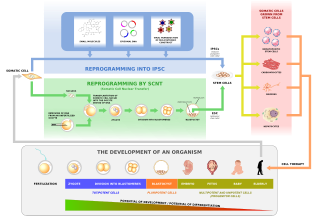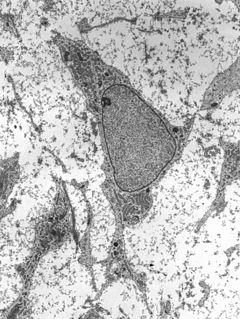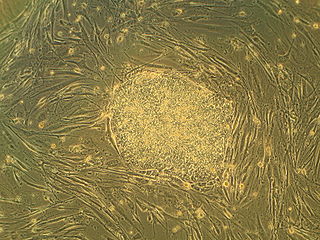
Human cloning is the creation of a genetically identical copy of a human. The term is generally used to refer to artificial human cloning, which is the reproduction of human cells and tissue. It does not refer to the natural conception and delivery of identical twins. The possibility of human cloning has raised controversies. These ethical concerns have prompted several nations to pass laws regarding human cloning and its legality.

Stem cells are cells that can differentiate into other types of cells, and can also divide in self-renewal to produce more of the same type of stem cells.

Embryonic stem cells are pluripotent stem cells derived from the inner cell mass of a blastocyst, an early-stage pre-implantation embryo. Human embryos reach the blastocyst stage 4–5 days post fertilization, at which time they consist of 50–150 cells. Isolating the embryoblast, or inner cell mass (ICM) results in destruction of the blastocyst, a process which raises ethical issues, including whether or not embryos at the pre-implantation stage should have the same moral considerations as embryos in the post-implantation stage of development. Researchers are currently focusing heavily on the therapeutic potential of embryonic stem cells, with clinical use being the goal for many labs. Potential uses include the treatment of diabetes and heart disease. The cells are being studied to be used as clinical therapies, models of genetic disorders, and cellular/DNA repair. However, adverse effects in the research and clinical processes such as tumours and unwanted immune responses have also been reported.
A stem cell line is a group of stem cells that is cultured in vitro and can be propagated indefinitely. Stem cell lines are derived from either animal or human tissues and come from one of three sources: embryonic stem cells, adult stem cells, or induced stem cells. They are commonly used in research and regenerative medicine.

Proposition 71 of 2004 is a law enacted by California voters to support stem cell research in the state. It was proposed by means of the initiative process and approved in the 2004 state elections on November 2. The Act amended both the Constitution of California and the Health and Safety Code.
The stem cell controversy is the consideration of the ethics of research involving the development, use, and destruction of human embryos. Most commonly, this controversy focuses on embryonic stem cells. Not all stem cell research involves human embryos. For example, adult stem cells, amniotic stem cells, and induced pluripotent stem cells do not involve creating, using, or destroying human embryos, and thus are minimally, if at all, controversial. Many less controversial sources of acquiring stem cells include using cells from the umbilical cord, breast milk, and bone marrow, which are not pluripotent.
Stem-cell therapy is the use of stem cells to treat or prevent a disease or condition.

The Cambridge Biomedical Campus is the largest centre of medical research and health science in Europe. Located at the southern end of Hills Road in Cambridge, England the campus is managed by the University of Cambridge. The site is funded by organisations such as the Cambridge University Hospitals NHS Foundation Trust, the Wellcome Trust, Cancer Research UK, the UK government's Medical Research Council and has National Institute for Health Research Biomedical Research Centre status. It is an accredited UK academic health science centre and home to Addenbrooke's Hospital and the university's medical school.

Ann A. Kiessling is an American reproductive biologist and one of the leaders in human parthenogenic stem cell research at The Bedford Research Foundation. She was an Associate Professor in teaching hospitals of Harvard Medical School from 1985 until 2012.

The ALS Therapy Development Institute is a non-profit biotechnology research organization focused on finding treatments for amyotrophic lateral sclerosis (ALS). With a staff including more than 30 scientists, it operates a research and development program centered on ALS.
The New York Stem Cell Foundation (NYSCF) is an American 501(c)(3) nonprofit organization, founded in the Spring of 2005, with the mission “accelerating cures for the major diseases of our time through stem cell research.” NYSCF established the first privately funded stem cell laboratory in New York City, where NYSCF researchers and scientific collaborators conduct advanced stem cell investigations. The foundation supports stem cell scientists through the NYSCF Innovator Program, and it engages the academic, medical, pharmaceutical, and biotechnology communities by hosting the annual translational stem cell research conference and other symposia throughout the year. NYSCF aims to educate the public on the importance of stem cell research in new therapies.
Kevin Eggan is a Professor of Stem Cell and Regenerative Biology at Harvard University, known for his work in stem cell research, and as a spokesperson for stem cell research in the United States. He was a 2006 recipient of a MacArthur Fellowship. In 2005, he was named to the MIT Technology Review TR35 as one of the top 35 innovators in the world under the age of 35.

Shinya Yamanaka is a Japanese Nobel Prize-winning stem cell researcher. He serves as the director of Center for iPS Cell Research and Application and a professor at the Institute for Frontier Medical Sciences at Kyoto University; as a senior investigator at the UCSF-affiliated J. David Gladstone Institutes in San Francisco, California; and as a professor of anatomy at University of California, San Francisco (UCSF). Yamanaka is also a past president of the International Society for Stem Cell Research (ISSCR).

Leonard Paul Blair is an American prelate of the Roman Catholic Church serving as the thirteenth bishop and fifth and current archbishop of the Archdiocese of Hartford, Connecticut. He was installed as the Archbishop of Hartford on December 16, 2013.
Stem cell laws are the law rules, and policy governance concerning the sources, research, and uses in treatment of stem cells in humans. These laws have been the source of much controversy and vary significantly by country. In the European Union, stem cell research using the human embryo is permitted in Sweden, Spain, Finland, Belgium, Greece, Britain, Denmark and the Netherlands; however, it is illegal in Germany, Austria, Ireland, Italy, and Portugal. The issue has similarly divided the United States, with several states enforcing a complete ban and others giving support. Elsewhere, Japan, India, Iran, Israel, South Korea, China, and Australia are supportive. However, New Zealand, most of Africa, and most of South America are restrictive.
Stem cell laws and policy in the United States have had a complicated legal and political history.
Ira Barrie Black was an American physician and neuroscientist who was an advocate of stem cell research and was the first director of the Stem Cell Institute of New Jersey at Robert Wood Johnson Medical School which was created to advance research in the field.
The Morgridge Institute for Research is a private, nonprofit biomedical research institute in Madison, Wis., affiliated with the University of Wisconsin–Madison. The institute works to improve human health by conducting, enabling and translating interdisciplinary biomedical research. Research in regenerative biology, virology, medical devices and core computational technology is currently underway.
The Albrecht Kossel Institute for Neuroregeneration is a medical research hospital located in Rostock, Germany. It was formed from the neurobiological laboratory of the hospital for neurology at the University of Rostock, and it operates under the auspices of The University Clinic of Rostock.

The Ice Bucket Challenge, sometimes called the ALS Ice Bucket Challenge, is an activity involving the dumping of a bucket of ice and water over a person's head, either by another person or self-administered, to promote awareness of the disease amyotrophic lateral sclerosis and encourage donations to research. It went viral on social media during July–August 2014. In the US, many people participated for the ALS Association, and in the UK, many people participated for the Motor Neurone Disease Association, although some individuals opted to donate their money from the Ice Bucket Challenge to other organizations.













